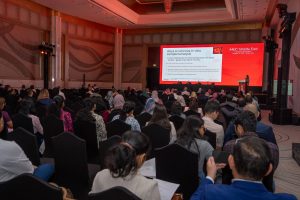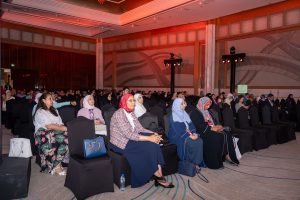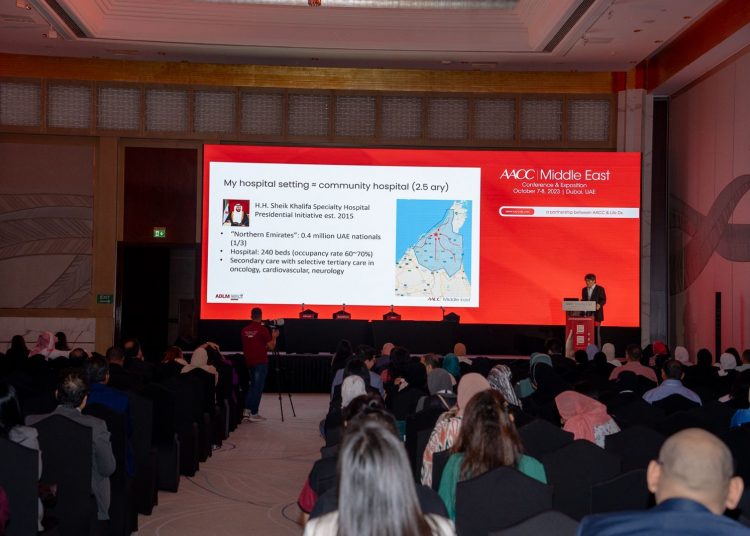Under the patronage of Dubai Health Authority, the fifth edition of 2023 AACC Middle East Conference and Exposition has concluded on Sunday with a list of recommendations.
The event witnessed the participation of over 1800 experts, physicians, and specialists from countries across the globe at Grand Hyatt in Dubai.
Organised by Abu Dhabi-based Life Diagnostics, in partnership with the Association for Diagnostics and Laboratory Medicine (formerly AACC), the 2023 AACC Middle East event ended with nine recommendations including promoting the integration of data analytics in clinical laboratory services for improved efficiency and patient care and encourage informed decision-making in prenatal screening to ensure the well-being of both mothers and babies.
Experts also call to support research and advancements in pediatric lipid screening and endocrine disorder diagnostics as well as emphasize the critical role of laboratory testing in preventive medicine, such as the early detection of chronic hepatitis and HPV-related cancer.
The experts recommended to support the use of genetic testing in the diagnosis and treatment of hereditary cardiovascular disorders and cancer.
The conference recommended promoting collaboration between laboratory professionals and physicians to optimize patient outcomes.
The participants also agreed to continue exploring innovative approaches in quality control and laboratory management along with fostering the adoption of continuous glucose monitoring, digital diagnostics, and artificial intelligence (AI) in laboratory medicine.
Among other recommendations, the experts encourage ongoing dialogue and exchange of knowledge in laboratory medicine.

The AACCME 2023 conference was a significant gathering of experts and professionals, fostering discussions and collaborations that will drive advancements in clinical laboratory services and diagnostics.
The recommendations above highlight key takeaways for attendees to implement in their respective fields.
Hosam Fouad, founder and CEO of Life Diagnostics, lauded the massive success of the highly anticipated event due to the high number of participants in the fifth edition.
“I want to express my happiness with the wide scope of participants this year. There are discussions underway to explore options for expanding the upcoming 2024 conference, including increasing attendee numbers, or extending the conference’s duration,” Mr Fouad said.
“There has been discussion with Mark Golden, CEO of the Association for Diagnostics and Laboratory Medicine about increasing the workshops and attracting more experts from universities and specialized training institutes to participate in the next edition after the major success this year.”
Mr Fouad expressed his gratitude to Dubai Health Authority for the support during the conference.
“Due to the extensive support and facilities offered to conference organizers, the UAE is considered a pivotal destination for hosting and attracting major specialized scientific conferences from around the world,” Mr Fouad added.

Dr Hisham Shams, a member of the AACC Middle East Scientific Committee and Chief Scientific Officer for Life Diagnostics said the two-days event came out with a list of recommendations including incorporating data analysis into clinical laboratory services to improve efficiency and enhance patient care as well as encouraging well-informed decision making in maternal and childhood examinations to safeguard the health of both mothers and children.
“The laboratory medicine has a significant role in the modern era as doctors’ decisions depend by more than 80% on laboratory results. Failure to ensure that laboratory physicians are fully proficient in modern examination and diagnostic methods can result in adverse outcomes that impact the patient,” Dr Shams said.
Moreover, Dr Rania Bedair, a member of the AACC Middle East Scientific Committee and Chief Medical Officer at Life Diagnostics, said: “Technological advancements in laboratory medicine in the last decade have greatly enhanced productivity, efficiency, and quality.
Consequently, there is a growing need for more effective communication channels between physicians and laboratory experts to prevent diagnostic and analytical errors. It is important to use AI across various laboratory analysis domains, particularly in tumor diagnosis, where it can deliver incredibly precise and swift results.”
She pointed out that the high level of participation in the current conference has created a platform for scientific collaboration and signing memoranda of understanding among laboratory professionals worldwide.
“The collaboration serves as the fundamental basis for any form of success in the field of laboratories, with the ultimate goal of ensuring both work quality and patient safety,” she added.
The AACC Middle East Conference and Exposition made its debut outside the United States in 2017, specifically in the United Arab Emirates.
Since then, it has become an annual event hosted in the UAE as the country serves as a hub for scientific conferences, contributing to the dissemination of conference culture and the advancement of laboratory analysis standards in both the UAE and the region.
Since its launch in the UAE, the conference has been committed to crafting and advancing a scientific program that assists professionals in enhancing their professional performance and staying abreast of the latest innovations in the field of laboratories.






Discussion about this post